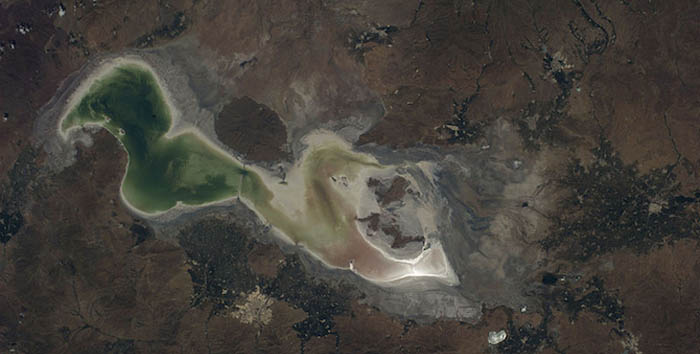Hossein Akhani, a botanist at the University of Tehran, told Discovery News that the 2008-square-mile lake was in “good condition” until 1995. Akhani first visited the lake in 1987 when it “was full of water and the coasts were full of salt-tolerant plants.”
“The lake was a paradise for flamingos and a habitat for large numbers of water fowls and migratory birds,” Akhani said. “The water included the endemic brine shrimp, which feed on phytoplankton and were the main food for the birds. Furthermore, it included 102 islands, some of which were large enough to be inhabited by mammals, such as Persian fallow deer and wild sheep.”
Since the lake began to dry up about two decades ago, both humans and wildlife have been impacted.
Many of its animals sunk into the mud and died. Others escaped to the mainland, where they have been hunted. Without water, the brine shrimp have died out, Akhani said, “so there is no more food for the birds.” Native rare plants, such as the salt-tolerant plants that Akhani studies, are disappearing too.
As for people in the region, they are now being exposed to “noxious dust” coming off the lakebed, and local crops are threatened, Richard Stone, who prepared a report about the project to save the lake in this week’s issue of Science, told Discovery News.
At least four factors could have adversely affected the lake, according to Stone: drought and rising temperatures, poor water management, damning of three rivers that supply nearly 90 percent of Lake Urmia’s water, and a switch by local farmers to “thirstier crops.”
Stone explained that the damning of the rivers was done for irrigation and hydropower. In terms of crops, the region used to be known for its winemaking before 1979. After the country became an Islamic republic, and wine was forbidden, farmers turned to more water-reliant crops, such as sunflowers, wheat, apples and sugar beets.
Akhani is a member of the Ecological Restoration Working Group that has submitted a detailed plan to authorities based on ecological and International Union for Conservation of Nature criteria.
Akhani and his colleagues hope that members of the international scientific community and governments from other countries will, he said, “work with the Iranian authorities and scientists to monitor and support the restoration of the lake, and avoid mistakes that in former times caused the desiccation of the lake.”
He said that if a planned program to reduce water consumption in the area by 40 percent succeeds, then he is optimistic that the restoration plan will work.
Stone is unsure at this point of the plan’s chances of succeeding.
“Is it too late to save the lake?” he asked. “Maybe. But the Iranian government is going to be pouring a ton of money into a restoration effort over the next decade. I wish them luck.”
In the meantime, Stone recounted a visit to the lake this past July, where he and Akhani observed people picnicking on the eroded beach, and listening to Persian music blaring from their car radios.
“But the atmosphere felt more like a wake than a festival,” Stone said. “As Akhani told me, ‘These people have come to say goodbye to the lake.’”
More about:
















































